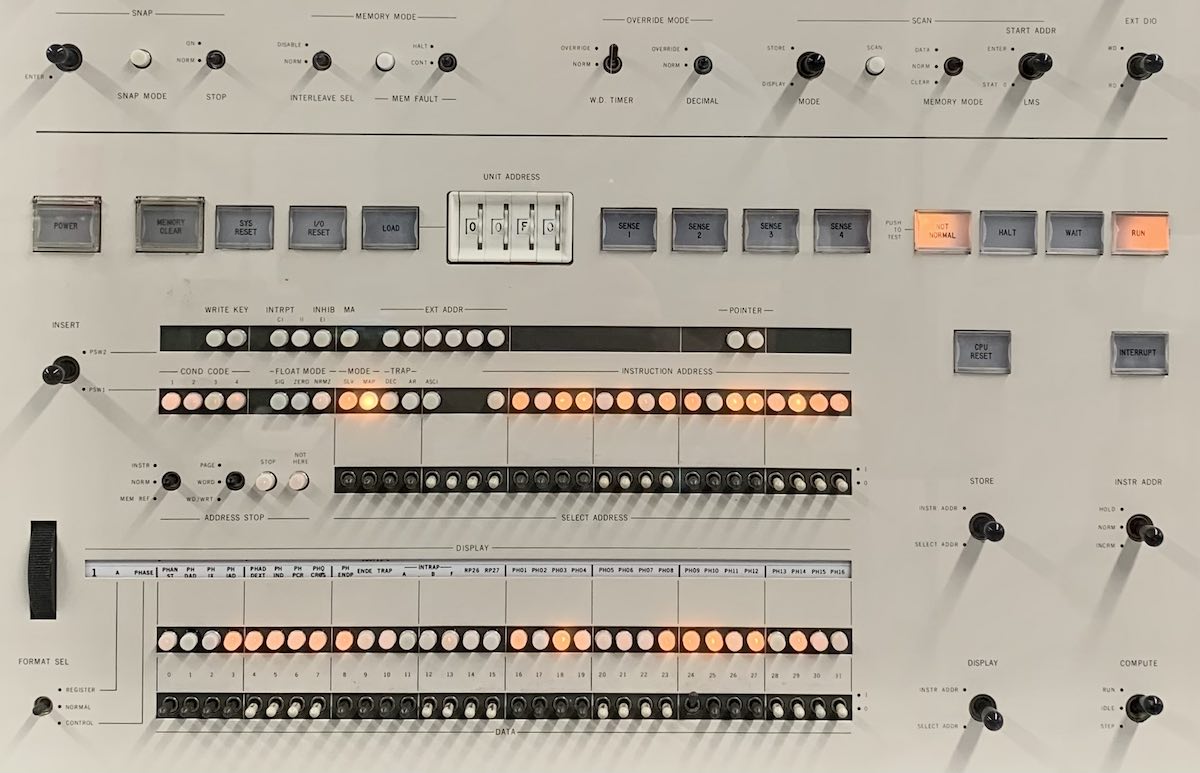What do you do when you need to make a new file in a project?
If you're like me, you often duplicate an existing file that's similar and make changes from there. If you're also like me, this leads to frequent copy/pasta errors to the point where you wonder whether it would just be easier to type this stuff out each time. The term I picked up while writing this post is "boilerplate fatigue" and it's perfect.
This is one of many tiny professional pet peeves that makes me ask "what would a real engineer do?" The answer to that is usually the one that means the least amount of work and the most amount of consistency: "Automate it," says the voice of a real engineer in my head. 🤖

The Xerox Sigma 9 introduced in 1971
Enter Hygen. If you've never used a code generator before, the idea is to make creating new project files easier by providing a template that's hydrated with values from a prompt or command line flags. Instead of copying an existing file, changing what's there, remembering anything that was missing, and getting that sinking "doing it wrong" feeling, you run a command, answer a few questions, and you have a fresh, new file.
This appeals to me in my Eleventy site here because I have a number of custom fields in the front-matter that I often forget about or need to look up in layout files. These fields are a bit different for each content type and I often forget which ones can be used in a post and which in a page. I also have a number of shortcodes and patterns I use and I want a way to remind myself of what those are.
Let's see how this all comes together ...
Follow the quick start to get Hygen installed on the command line. The point where this tutorial starts is where you can get the following response on the command line:
❯ hygen
Error: please specify a generator.
Hygen v6.1.0Get yourself to the root of your Eleventy project and run the following:
❯ hygen init self
# ... adds generator templates
❯ hygen generator with-prompt post
# ... adds post template⚠️ If you get a warning like "SyntaxError: Invalid left-hand side expression in prefix operation", the file renaming solution here fixed the issue for me.
What we did here was create the templates that create templates for what we want to create (so meta). Then we created the actual templates we'll use to generate new posts. You should now be able to run the generator and get a new file:
❯ hygen post with-prompt
✔ What's your message? · Begin again
Loaded templates: _templates
added: app/hello.jsAt this point, I've got 7 new files and a remote idea of what is going on here. I'm going to be making one of these for each of my content types and the custom fields within.
There really is a bit of meta going on here so I'm going to start with the simplest task: adjusting our post generator to create posts in the right format. In general, my posts:
- are stored in a year sub-directory in a main posts directory
- get their date and permalink from the file name
- have a number of custom fields
Let's adjust where the file name and location using conditional rendering and a change case helper:
// _templates/post/with-prompt/hello.ejs.t
---
to: input/posts/<%= (new Date()).getFullYear() %>/<%= (new Date()).getFullYear() %>-<%= (new Date()).getMonth() + 1 %>-<%= (new Date()).getDate() %>-<%= h.changeCase.param(message) %>.md
---This takes the current year, along with the command line prompt response, and sticks a Markdown file in just the right place:
input/
├─ posts/
│ ├─ 2022/
│ │ ├─ 2022-1-11-post-draft.mdThat is a bit verbose, though, so I added a .hygen.js file to extend the helper object with a few handy functions:
// .hygen.js
const getYear = (new Date()).getFullYear();
const getMonth = (new Date()).getMonth() + 1;
const getDay = (new Date()).getDate();
module.exports = {
helpers: {
getDate: () => `${getYear}-${getMonth}-${getDay}`,
getYear
}
}... and updated the post template:
---
to: input/posts/<%= h.getYear %>/<%= h.getDate() %>-<%= h.changeCase.param(message) %>.md
---Much better!
We've got a file going to the right place, next we're going to construct the front matter that goes with each post. In order to find all these different fields, I combined:
- The include file that creates the head output
- The post layout template
- The include file that outputs the content footer
Figuring all this out for this post made me happy that I'm collecting it all together in one place. I can add all these as prompts in the creation process and not have to go hunting down what fields are possible when I create new posts.
The list of fields I use as of this writing are:
titlefor the main, visible title and incoming link textmeta_titlefor the title tag (defaults totitlein the template)excerptfor the short text on post listingsmeta_description(defaults toexcerptin the template)featured_imgfor the small thumbnail image on certain listing pagestagscanonical_linklink_tofor any post that refers or replies to another URLhn_linkfor Hacker News submissions
Each field needs a prompt in the prompt.js file for the generator. Most of these are just basic inputs but I took a look at the library Hygen uses for the prompts and ... wow! The number of field types is mind-blowing!
One great feature of this library is the ability to write custom validation code. I use this for checking to make sure I'm not skipping required fields, like the title. The logic is simple here: return true if it passes validation or a string error message if not. See the next code block for how I'm using it for titles.
I'll be honest, I'd like to spend a day thinking of things to add to posts just so I can use more of these prompts but that's another day. For now, everything is a basic input besides tags. Here's the start of the prompt file:
// _templates/post/with-prompt/prompt.js
module.exports = [
{
type: 'input',
name: 'title',
message: "Post title",
validate: (value) => !value ? "Title cannot be empty" : true
},
{
type: 'list',
name: 'tags',
message: "Enter tags, separated by commas"
// TODO: Validate against a list of existing tags
},
]... which prompts:
❯ hygen post with-prompt
✔ Post title · Generate posts in Eleventy
✔ Enter tags, separated by commas · Eleventy, JavaScript
Loaded templates: _templates
added: input/posts/2022/2022-1-10-generate-posts-in-eleventy.md... and, when combined with this template:
---
title: <%= title %>
tags: ["<%- tags.join('\", \"') %>"]
---
## Some markdown!... outputs:
---
title: Generate new posts in Eleventy with Hygen
tags: ["Eleventy", "JavaScript + TypeScript"]
---
## Some markdown!So awesome!
For things like the meta_title that are optional, Hygen provides a way to check whether that value was entered and then output content if it is by using local variables. For the list prompt type, like tags, you need to check locals.tags.length because an empty array is truth-y in JavaScript.
Once I had all of the post front matter outputting, I added all of the shortcodes and other formatting options I'm able to use in the body of the template. Then I copied all of this over to a page generator and removed the fields that are not used in that layout. I used the EJS include function and a predefined variable to import shared output to both templates.
By the end of this, I was fully in "human with a hammer" mode and thinking of all the places I could use Hygen. For now, though, just this will save time, mistakes, and annoyance!
< References >
- Full changeset to add Hygen to my site and a few additional features
- Hygen homepage and documentation and GitHub repo
< Take Action >
Comment via:
Subscribe via:
< Read More >
Tags
Newer

Mar 07, 2022
Engineering Velocity from the Bottom Up
When I look to increase my velocity, I'm trying to deliver more work I'm proud of without burning out. I want to get the most out of my time and maximize the parts of the job that I enjoy. Here's how.
Older

Jan 04, 2022
Eleventy Custom Content Type Collections and Layouts
How-to on creating separate collections and layouts for a custom content type. In this case: cocktails!